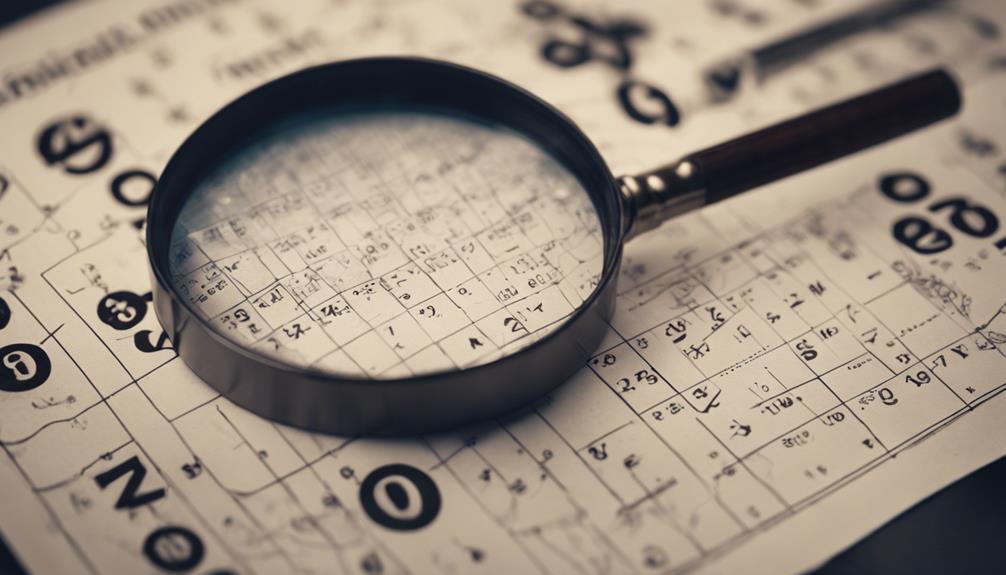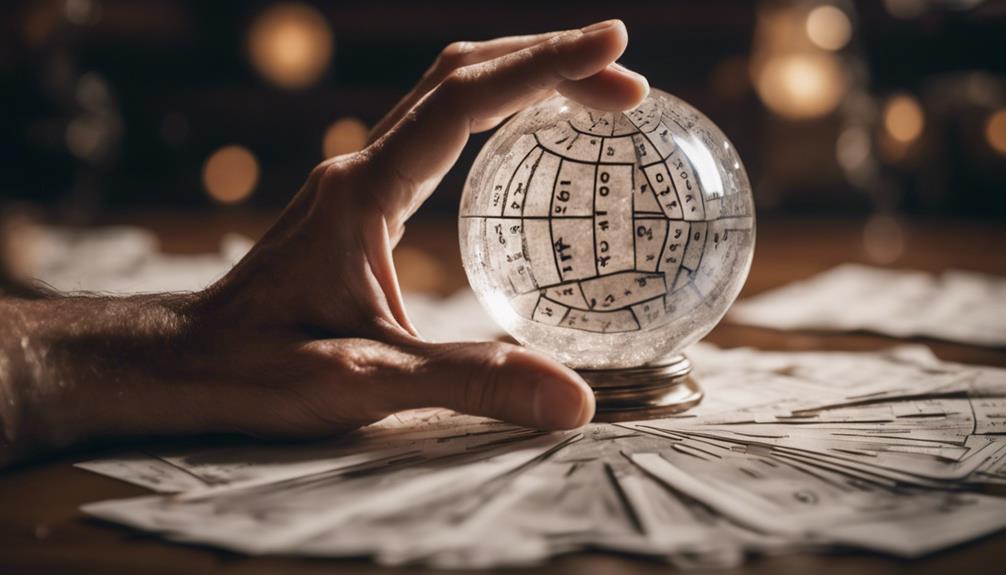Critics highlight numerology's shortcomings due to the lack of scientific foundation, relying on mystical beliefs rather than empirical data. Ambiguous interpretations in numerology give rise to broad and generalized advice based on subjective readings. Overreliance on generalizations hampers precision and specificity, affecting the accuracy of predictions. Inconsistencies in assigning meanings to numbers create conflicting advice, challenging the system's reliability. The absence of concrete evidence further weakens numerology's credibility, viewing it more as a belief system than a validated method. Understanding these critiques sheds light on the challenges numerology faces in gaining acceptance. Explore the complexities beyond the surface critique.
Key Takeaways
- Lack of scientific basis and empirical evidence undermines numerology's credibility.
- Numerology's ambiguity allows for broad and generalized advice, lacking specificity.
- Overreliance on generalizations diminishes the accuracy and precision of numerological predictions.
- Inconsistencies in numerological systems lead to conflicting advice and interpretations.
- Numerology fails to provide concrete evidence to substantiate its claims, lacking empirical support.
Lack of Scientific Basis
Numerology lacks empirical evidence and scientific support, rendering its claims unsubstantiated and unreliable. When it comes to determining one's life path number, expression number, soul urge, or any other aspect of their personality through a numerology chart, the foundational premise rests on mystical beliefs rather than concrete data. Despite the alluring promise of insight into one's inner workings, the lack of scientific basis leaves numerology open to skepticism and criticism.
The life path number, often considered a key element in numerology, is derived from one's birthdate in a manner that lacks empirical validation. Similarly, the calculation of the expression number, which purportedly reveals one's talents and abilities, relies on subjective interpretations rather than objective measurements. The soul urge, believed to uncover one's inner desires and motivations, is another concept in numerology that lacks scientific grounding.
In essence, the reliance on mystical interpretations rather than scientific evidence undermines the credibility and reliability of numerology's claims, leaving its principles open to scrutiny and skepticism.
Ambiguity in Interpretations

The presence of ambiguity in numerology interpretations allows for wide-ranging and generalized advice that lacks specificity. In numerology, the ambiguous nature of the information provided can lead to varied interpretations depending on the individual's perspective. This subjectivity in numerology readings means that what one person sees as a clear indication may appear entirely different to another. The lack of concrete criteria in numerology contributes to the ambiguous nature of the interpretations, making it challenging to provide specific and tailored advice.
When it comes to numerology, the interpretations can be open to broad claims due to their ambiguous nature. Individuals may find ways to fit the descriptions to match their own experiences, leading to a self-fulfilling prophecy effect. This ambiguity in numerology can sometimes result in individuals seeing what they want to see, rather than receiving objective and precise guidance. Hence, it's important to approach numerology interpretations with a critical eye, considering the inherent subjectivity that can influence the advice given.
Overreliance on Generalizations

Have generalizations in numerology readings compromised the accuracy and specificity of predictions?
Numerology often simplifies complex individuals into broad categories based on their birth date, year, or three numbers derived from their birth certificate. This overreliance on generalizations can lead to predictions that lack depth and fail to address the unique nuances of each person's life. Critics argue that by providing vague advice that could apply to a wide range of individuals, numerology readings lose their precision and credibility.
The generic nature of numerology reports can result in interpretations that seem accurate to many people, regardless of their actual circumstances. This broad applicability may make individuals feel understood, but it also diminishes the reliability of numerological predictions. As a result, the overuse of generalizations in numerology undermines the specificity and accuracy that individuals seek when turning to this practice for guidance.
Inconsistencies in Numerological Systems

Critics point out that inconsistencies in assigning meanings to numbers among different practitioners and traditions within numerological systems lead to conflicting advice and predictions. This lack of essential uniformity in interpreting numbers like master numbers 11 and 22 creates confusion and hampers the reliability of numerology.
For instance, when calculating a Personal Year or Universal Year, the variations in how numbers are understood can result in vastly different outcomes. When determining the influence of numbers derived from one's birth name, discrepancies in interpretation can lead to contradictory insights.
In numerology, where precision is vital for accurate readings, the absence of standardized guidelines poses a significant challenge. To gain trust and recognition as a legitimate predictive tool, numerological systems must be something concrete and consistent, providing practitioners and clients with reliable and cohesive interpretations.
It's essential for numerologists to address these inconsistencies to enhance the credibility and effectiveness of numerology in offering meaningful insights and guidance. By providing a clearer framework and addressing potential discrepancies, numerologists can foster greater trust among both skeptics and enthusiasts alike. Additionally, an introduction to numerology basics can help laypersons better understand the principles behind various numerological methods, ensuring they approach the practice with a more informed perspective. This, in turn, will allow for deeper engagement and a broader acceptance of its insights.
Failure to Provide Concrete Evidence

Despite the widespread practice of numerology, the discipline struggles to provide concrete evidence to substantiate its claims. Numerology operates on the belief that numbers hold significant meaning and influence over various aspects of life. However, when it comes to proving the accuracy and reliability of numerological interpretations, the domain of number crunching hits a dead end.
When delving into the world of numerology, one quickly realizes that pretty much everything is open to interpretation. This flexibility allows for diverse readings based on individual perspectives rather than concrete facts. While this may appeal to those seeking guidance or insight, it falls short of providing substantial evidence to support its assertions.
In a world where evidence-based practices drive innovation and progress, numerology stands out as a little bit about numerology and a whole lot about personal belief. Its lack of empirical data sets it apart from disciplines that rely on scientific research and validation. Without concrete evidence to back its claims, numerology remains in a domain that's completely different from verifiable sciences.
Neglect of Individual Complexity

Numerology oversimplifies our personalities by reducing them to a single life path number, neglecting the rich tapestry of our individual complexities.
It fails to acknowledge the unique experiences that shape each of us, providing generalized readings that overlook the nuances of our lives.
Oversimplifying Personal Traits
Reducing individuals to a single Life Path number oversimplifies personal traits, neglecting the complexity of each person's unique characteristics and experiences. While numerology may assign a specific number to represent someone's personality, this approach fails to capture the intricacies that make each individual distinct.
It's like trying to define a whole person based on a single snapshot – there's so much more beneath the surface. Just because a lot of people might notice the same number on a license plate doesn't mean they all share the same destiny or traits.
Personalities are multifaceted, influenced by a myriad of factors that go beyond a single numerical calculation. By oversimplifying personal traits, numerology misses out on the richness and depth of what makes each person truly unique.
Ignoring Unique Experiences
Neglecting the nuances of individual experiences and complexities, numerology overlooks the diverse factors that shape human personalities. When contemplating the intricacies of each person's life, numerology falls short in capturing the full essence of an individual. Here's why numerology can't really account for the uniqueness of personal experiences:
- One Number: Numerology often reduces complex individuals to a single number, failing to represent the multifaceted nature of human beings.
- Exact Same Thing: Different individuals born on the same date or with similar names may end up with the exact same numerology readings, despite leading vastly different lives.
- Can't Really: Numerology can't really capture the emotional depth, personal growth, and varied experiences that shape an individual's personality.
- Make Sure: To truly understand someone, one must ensure to contemplate their distinct journey and the multitude of factors that influence their being.
Failing to Consider Nuances
Overlooking the intricate layers of personal experiences and complexities, we fail to truly grasp the depth of individual personalities when exploring numerology.
Each person is a unique blend of joys, sorrows, and aspirations that shape their being. Numerology, with its urge to simplify and categorize based on a set of numbers, falls short in capturing the essence of who we are.
Oh my god, the idea that a single number can define me seems absurd when I contemplate the richness of my experiences. If we go back to the core of what makes us individuals, we realize that I'm a little more than just a sum of digits.
Numerology's failure to take into account these nuances limits its ability to provide genuine insights into our complex selves.
Skepticism Amongst Experts

Experts in the field, such as mathematician Douglas Arnold, raise concerns about the validity of numerology due to its lack of scientific evidence. Despite skepticism, some numerologists like Mojan maintain faith in numerology's predictive abilities.
This divide highlights the ongoing debate surrounding the credibility of numerology within expert circles.
Expert Validity Concerns
While some may question the validity of numerology, our skepticism towards its credibility stems from the lack of rationality and evidence-based support found by mathematicians like Douglas Arnold. When we think of numerology, we always see a field lacking in empirical data and scientific verification. Here are some key concerns that contribute to our doubt:
- Numerology lacks a solid foundation in mathematics and science.
- Experts find numerology to be more mystical than logical.
- The predictive power of numerology is often attributed to chance rather than a systematic approach.
- Without scientific evidence, numerology's effectiveness and reliability are brought into question.
These factors lead experts to view numerology as more of a pseudoscience than a proven method for achieving success.
Lack of Scientific Evidence
Our doubts regarding numerology's credibility stem from the absence of scientific evidence supporting its claims. Mathematicians and experts have raised skepticism about numerology, considering it a pseudoscience lacking empirical data. Critics argue that numerology relies on subjective interpretations rather than concrete scientific proof, leading to doubts about its reliability.
The belief that numerology is more of a belief system than a scientifically validated method further erodes its credibility. Without every single piece of evidence pointing towards its effectiveness, numerology struggles to gain acceptance among those who value empirical support.
When going to look for concrete scientific backing, one may find a lack of substantial proof to validate numerology's claims. In a world that values stuff that's backed by research, numerology falls short in providing the wow that's necessary to convince skeptics.
Frequently Asked Questions
What Do Mathematicians Think of Numerology?
Mathematicians view numerology skeptically, finding it lacking in scientific validity. Numbers are seen as holding predictive power, but not in a mystical sense, according to mathematical perspectives. The emphasis is placed on rational explanations over arbitrary cosmic meanings in numerology.
People are drawn to numerology due to seeking simplified explanations amidst the universe's complexity. Mathematicians question numerology's validity due to its lack of substantive mathematical basis.
What Is the Theory Behind Numerology?
Numerology operates on the premise that names and birth dates hold significant sway over one's life journey and characteristics. By assigning frequencies to numbers, this theory predicts future outcomes and guides decisions.
Calculating life path numbers from birth dates reveals one's predetermined life course. Numerologists draw on specific numbers to offer insights and recommendations for favorable results.
Embracing numerology can add a touch of mystique to daily choices, making the ordinary feel extraordinary.
What Is the Most Powerful Numerology?
Master Numbers, such as 11, 22, and occasionally 33, are revered in numerology for their heightened spiritual vibrations and significance. These numbers are believed to bestow individuals with unique abilities and challenges.
They act as amplifiers to the traits linked with the single-digit numbers they reduce to. Master Numbers add depth and intensity to a person's numerology chart, hinting at potential for profound spiritual growth and transformation.
What Does Numerology Tell About a Person?
Numerology reveals insights about a person's strengths, weaknesses, talents, and life purpose. By analyzing numbers derived from a person's name and birth date, numerology offers a framework for understanding personality traits and characteristics.
It guides individuals towards their destined path and aids in self-discovery. This practice categorizes people based on specific numbers, providing a tool for self-reflection and personal growth through interpreting the numerical aspects of an individual's life.
Conclusion
To sum up, numerology may seem intriguing, but its lack of scientific backing and reliance on generalizations make it a questionable practice. The ambiguity in interpretations, inconsistencies in numerological systems, and failure to provide concrete evidence only add to the skepticism amongst experts.
While some may find comfort in the patterns and predictions numerology offers, it's essential to approach it with caution and an understanding of its limitations. After all, as they say, 'the proof is in the pudding.'









